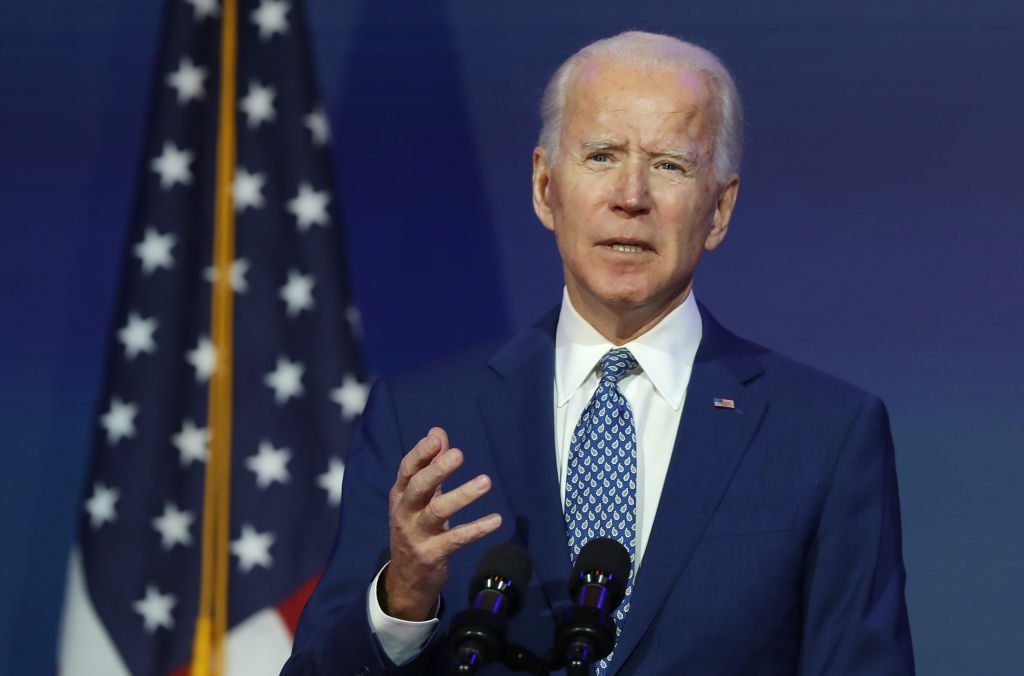Biden Can Start to Heal America by Embracing Foreign Policy Restraint

Three days after the presidential election, with the outcome still hanging in the balance, Roger Cohen of the New York Times published a column that offered his take on the ongoing controversy. “The People Versus Donald Trump,” read the headline. “They want him to go, and he won’t listen,” added the subhead.
Now there is nothing unusual in a newspaper columnist opining about what “the people” want, even one who, as in Cohen’s case, doesn’t live in the United States. But Cohen’s judgment overlooks this striking fact: while Donald Trump may have lost the presidency, he won millions more votes this year than he did in 2016. His total haul of nearly 70 million—exceeding Barack Obama’s total when elected to his first term in 2008—suggests that some approximation of “the people” were keen for him to remain in office for another four years.
Furthermore, Joe Biden’s narrow victory in what he himself described as “the most important election in our lifetime” leaves the national political landscape remarkably unchanged. Democratic hopes of gaining control of the Senate appear unlikely to materialize. In the House of Representatives, the party actually lost seats. Biden is a winner with no coattails. The electorate that has ousted Trump from the presidency has refrained from endorsing a leftward shift in American politics. Biden brings to office a mandate that is somewhere between slight and non-existent.
So like it or not, even as Trump himself leaves the White House, the forces that vaulted him to the center of national politics will persist. To revert to Cohen’s formulation, on matters related to race, religion, culture, climate, and the economy, “the people” are of two minds—or, more accurately, of several minds. As one prominent expression of the cleavages that have fractured our country, Trumpism, with or without Trump, will continue to play a large role in national politics for some time to come.
Biden’s vow to heal those cleavages is necessary, commendable, and undoubtedly heartfelt. Yet doing so will take more than reassuring words from a decent but aging career politician presiding over a divided government. Even though the outcome of the election now appears settled, don’t expect Trump’s legions to climb aboard the Biden bandwagon.
Let me suggest that there is one arena where Biden might actually make some progress toward fulfilling his promise to “save America’s soul.” I refer to foreign policy.
Progress here will require changing course on an issue that went almost entirely unmentioned during the run-up to the election: our nation’s disastrous affinity for war. Since the fall of the Berlin Wall in 1989, war has become the principal signature of American statecraft. Over the course of three decades of sustained military activism, U.S. troops have suffered terrible losses while winning few conclusive victories. “Forever wars” in places like Afghanistan and Iraq have added trillions of dollars to the national debt.
Responsibility for this record of squandered blood and treasure rests with both parties. Democrats and Republicans have squabbled over any number of issues. But when it comes to military power and its utility, a broad consensus has prevailed. That consensus finds expression in ever-increasing Pentagon budgets, an expansive global military presence, and a penchant for armed intervention in distant places.
In Washington, everyone supports the troops. Too few bother to think critically about what the troops are actually doing, where, and at what cost. Patriotism carries the taint of militarism.
On that score, Donald Trump was an exception. If the train wreck of his presidency has any redeeming feature, it is found in his recognition that “endless wars” do not serve the national interest. Of course, Trump being Trump, he demonstrated neither the attention span nor the constancy of purpose to make good on his vow to end them. Even so, his repeated promise to do so resonated with his followers. Put simply, Trumpism contains a strong antiwar component.
So if President-elect Biden is serious about bringing the country together, here is one place where he might find common ground with the 70 million who preferred his opponent. Pro-Trumpers will never agree with Biden on abortion, gun ownership, climate change, or “socialism.” But if a Biden administration restores a measure of prudence to U.S. military policy, they just might respond favorably.
What might prudence look like in practice? Greater restraint in the use of force offers one obvious example. Abandoning regime change as a foreign policy objective offers another. Reducing military spending in favor of addressing neglected needs at home offers a third.
Nothing in Joe Biden’s long career suggests that he will become an overtly antiwar president. But should he foster an approach to national security that emphasizes military restraint and creative diplomacy, he just might make a first step toward healing a broken democracy.
Andrew Bacevich is president of the Quincy Institute for Responsible Statecraft and TAC’s writer-at-large.
Comments